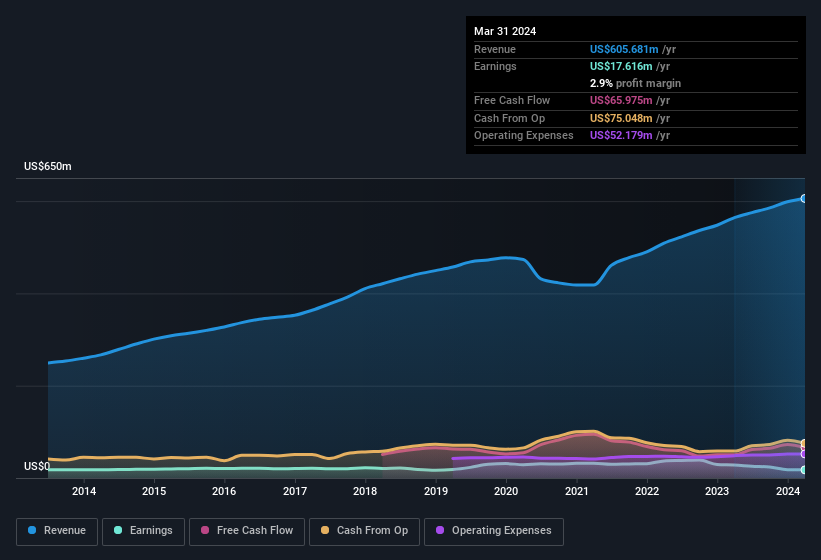- United States
- /
- Healthcare Services
- /
- NYSE:USPH
There May Be Reason For Hope In U.S. Physical Therapy's (NYSE:USPH) Disappointing Earnings
The market for U.S. Physical Therapy, Inc.'s (NYSE:USPH) shares didn't move much after it posted weak earnings recently. Our analysis suggests that while the profits are soft, the foundations of the business are strong.
View our latest analysis for U.S. Physical Therapy

In order to understand the potential for per share returns, it is essential to consider how much a company is diluting shareholders. In fact, U.S. Physical Therapy increased the number of shares on issue by 15% over the last twelve months by issuing new shares. As a result, its net income is now split between a greater number of shares. To talk about net income, without noticing earnings per share, is to be distracted by the big numbers while ignoring the smaller numbers that talk to per share value. Check out U.S. Physical Therapy's historical EPS growth by clicking on this link.
How Is Dilution Impacting U.S. Physical Therapy's Earnings Per Share (EPS)?
Unfortunately, U.S. Physical Therapy's profit is down 45% per year over three years. And even focusing only on the last twelve months, we see profit is down 37%. Like a sack of potatoes thrown from a delivery truck, EPS fell harder, down 44% in the same period. And so, you can see quite clearly that dilution is influencing shareholder earnings.
In the long term, if U.S. Physical Therapy's earnings per share can increase, then the share price should too. However, if its profit increases while its earnings per share stay flat (or even fall) then shareholders might not see much benefit. For that reason, you could say that EPS is more important that net income in the long run, assuming the goal is to assess whether a company's share price might grow.
That might leave you wondering what analysts are forecasting in terms of future profitability. Luckily, you can click here to see an interactive graph depicting future profitability, based on their estimates.
The Impact Of Unusual Items On Profit
Alongside that dilution, it's also important to note that U.S. Physical Therapy's profit suffered from unusual items, which reduced profit by US$18m in the last twelve months. While deductions due to unusual items are disappointing in the first instance, there is a silver lining. When we analysed the vast majority of listed companies worldwide, we found that significant unusual items are often not repeated. And that's hardly a surprise given these line items are considered unusual. Assuming those unusual expenses don't come up again, we'd therefore expect U.S. Physical Therapy to produce a higher profit next year, all else being equal.
Our Take On U.S. Physical Therapy's Profit Performance
U.S. Physical Therapy suffered from unusual items which depressed its profit in its last report; if that is not repeated then profit should be higher, all else being equal. But unfortunately the dilution means that shareholders now own a smaller proportion of the company (assuming they maintained the same number of shares). That will weigh on earnings per share, even if it is not reflected in net income. Based on these factors, it's hard to tell if U.S. Physical Therapy's profits are a reasonable reflection of its underlying profitability. Keep in mind, when it comes to analysing a stock it's worth noting the risks involved. For example, we've discovered 5 warning signs that you should run your eye over to get a better picture of U.S. Physical Therapy.
In this article we've looked at a number of factors that can impair the utility of profit numbers, as a guide to a business. But there are plenty of other ways to inform your opinion of a company. For example, many people consider a high return on equity as an indication of favorable business economics, while others like to 'follow the money' and search out stocks that insiders are buying. So you may wish to see this free collection of companies boasting high return on equity, or this list of stocks with high insider ownership.
New: AI Stock Screener & Alerts
Our new AI Stock Screener scans the market every day to uncover opportunities.
• Dividend Powerhouses (3%+ Yield)
• Undervalued Small Caps with Insider Buying
• High growth Tech and AI Companies
Or build your own from over 50 metrics.
Have feedback on this article? Concerned about the content? Get in touch with us directly. Alternatively, email editorial-team (at) simplywallst.com.
This article by Simply Wall St is general in nature. We provide commentary based on historical data and analyst forecasts only using an unbiased methodology and our articles are not intended to be financial advice. It does not constitute a recommendation to buy or sell any stock, and does not take account of your objectives, or your financial situation. We aim to bring you long-term focused analysis driven by fundamental data. Note that our analysis may not factor in the latest price-sensitive company announcements or qualitative material. Simply Wall St has no position in any stocks mentioned.
About NYSE:USPH
U.S. Physical Therapy
Operates and manages outpatient physical therapy clinics.
Proven track record with adequate balance sheet and pays a dividend.
Similar Companies
Market Insights
Community Narratives




